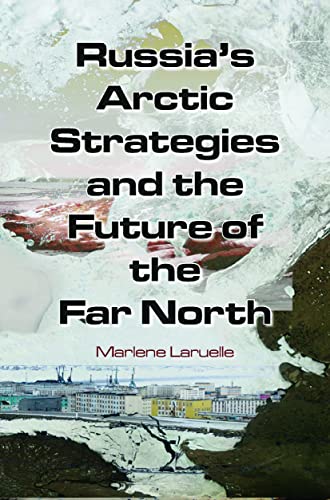All books / Book
Russia's Arctic Strategies and the Future of the Far North

| Full title: | Russia's Arctic Strategies and the Future of the Far North |
|---|---|
| ISBN: | 9780765635006 |
| ISBN 10: | 0765635003 |
| Authors: | Laruelle, Marlene |
| Publisher: | Routledge |
| Edition: | 1 |
| Num. pages: | 280 |
| Binding: | Hardcover |
| Language: | en |
| Published on: | 2013 |
Read the reviews and/or buy it on Amazon.com
Synopsis
This Book Offers The First Comprehensive Examination Of Russia's Arctic Strategy, Ranging From Climate Change Issues And Territorial Disputes To Energy Policy And Domestic Challenges. As The Receding Polar Ice Increases The Accessibility Of The Arctic Region, Rival Powers Have Been Manoeuvering For Geopolitical And Resource Security. Geographically, Russia Controls Half Of The Arctic Coastline, 40 Percent Of The Land Area Beyond The Circumpolar North, And Three Quarters Of The Arctic Population. In Total, The Sea And Land Surface Area Of The Russian Arctic Is About 6 Million Square Kilometres. Economically, As Much As 20 Percent Of Russia's Gdp And Its Total Exports Is Generated North Of The Arctic Circle. In Terms Of Resources, About 95 Percent Of Its Gas, 75 Percent Of Its Oil, 96 Percent Of Its Platinum, 90 Percent Of Its Nickel And Cobalt, And 60 Percent Of Its Copper Reserves Are Found In Arctic And Sub-arctic Regions. Add To This The Riches Of The Continental Shelf, Seabed, And Waters, Ranging From Rare Earth Minerals To Fish Stocks. After A Spike Of Aggressive Rhetoric When Russia Planted Its Flag In The Arctic Seabed In 2007, Moscow Has Attempted To Strengthen Its Position As A Key Factor In Developing An International Consensus Concerning A Region Where Its Relative Advantages Are Manifest, Despite Its Diminishing Military, Technological, And Human Capacities. Russia's Arctic Policy And The Interplay Of Domestic And International. Discursive Production And Decision-making Mechanisms ; Russia's Decision Making Regarding Arctic Affairs ; The Arctic As A Flagship For Putin-style Statehood ; An Internationally Recognized Brand For Russia ; The Arctic, A Soft Power Tool For Bilateral Relations? -- A Territory Or An Identity? The Far North In Russia's Statehood. The Imperial And Soviet Memory Of The Arctic ; What Administrative Status For Arctic Regions? ; Indigenous Peoples As Marginalized Stakeholders? ; The Nationalist Reading Of The Arctic: Russia's New Lebensraum -- Russia's Spatial And Demographic Challenges. Archipelago Russia : A Fragmented Territory ; Russia's Demographic Puzzle ; Evolving Patterns Of Arctic Demography And Mobility ; Is Migration The Future Of The Arctic Workforce? -- Climate Change And Its Expected Impact On Russia. Framing Climate Change Debates ; Climate Change In The Arctic ; Climate Change In The Russian Federation ; Calculating The Impact Of Climate Change On The Russian Economy ; Russia's Domestic Actors On Climate Change ; Russia's Hesitant Climate Change Policy -- The Russian Stance On Arctic Territorial Conflicts. The Soviet Historical Referent: The 1926 Decree ; Russian Claims On The Arctic Continental Shelf ; The Russian-u.s. Agreement On The Bering And Chukchi Seas ; The Issue Of The Barents Sea Issue And Its Solution ; The Dispute Over The Svalbard/spitsenberg Archipelago -- Projecting Military Power In The Arctic. The Russian Army Still Lost In Transition ; Upgrading The Northern Fleet And The Nuclear Deterrence ; Russia's Renewed Military Activism In The Arctic -- Resource Nationalism Vs. Patterns Of Cooperation. Beyond The Metrics Of The Arctic Bonanza ; Russia's Oil And Gas Strategies In The Arctic ; The Costs And Risks Of An Arctic-based Energy ; Foreign Actors And The Russian State: Competition Or Cooperation? ; The Arctic As A Mineral Eldorado? ; Hopes For Reviving The Fishing Industry -- Unlocking The Arctic? Shipping Along The Northern Sea Route ; Sovereignty Issues In The Russian Straits ; Hopes For An International Trade Lane Via The Nsr ; Ice Without Hype: The Harsh Realities Of Arctic Shipping ; A More Realistic Future: Nsr As A Domestic/destination Route ; Modernizing The Fleet And The Shipyard Sector -- Conclusion. Marlène Laruelle. Includes Bibliographical References And Index.